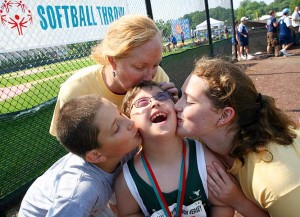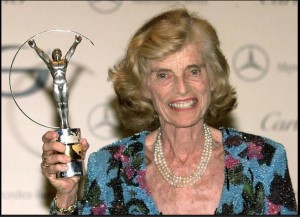Given the iconic legacies of her older brothers JFK and RFK, and the political career of her younger brother Sen Edward M. Kennedy, it would have been understandable if Eunice Shriver Kennedy shied away from public service. And, had it not been for the mental retardation of one of her sisters, she might have.
 For reports are that, after witnessing the way her institutionalized sister, Rosemary, came to life whenever she was given special attention and care, Shriver became convinced that the conventional way of treating people with mental disabilities (namely, by simply warehousing them) was cruel and inhumane.
For reports are that, after witnessing the way her institutionalized sister, Rosemary, came to life whenever she was given special attention and care, Shriver became convinced that the conventional way of treating people with mental disabilities (namely, by simply warehousing them) was cruel and inhumane.
This revelation led her in the 1950s, as vice president of the Joseph P. Kennedy, Jr. Foundation, to direct some of her family’s resources from Catholic charities to research on the causes and proper treatment of mental retardation.
The truth is that 75 to 85 percent of the retarded are capable of becoming useful citizens with the help of special education and rehabilitation. Another 10 percent can learn to make small contributions, not involving book learning, such as mowing a lawn or washing dishes.
This is the way Shriver expressed her visionary approach in a “groundbreaking article in the Saturday Evening Post” 1962; and it has been the basis for the treatment of people with mental disabilities ever since. Indeed, my sister-in-law Dr Barbara Hall, a dedicated special education professional, can attest to this fact.
But she did not win widespread appreciation until she showcased this approach at the first Special Olympics in 1968, which was held at Soldier Field in Chicago and involved 1,000 participants from 26 states and Canada.
Today, of course, the Special Olympics is even bigger than the YMCA, providing year-round sports programs for over 2.5 million mentally disabled people in 180 countries.
What proof have they got that as a group of people they can’t take losing? Who? Where does it come from, that idea? Somebody cries because they lose? I can tell you 50 people who cry — I go and watch my own kids cry when they lose.
This is the self-evident and personal way Shriver debunked the myth that competition and losing would cause irreparable harm to the psyches of disabled people during a 1987 interview with the Washington Post.
 Shriver received many honors for her public service, including the Presidential Medal of Freedom, the nation’s highest civilian award, which President Ronald Reagan awarded her in 1984.
Shriver received many honors for her public service, including the Presidential Medal of Freedom, the nation’s highest civilian award, which President Ronald Reagan awarded her in 1984.
She is survived by five children, including Maria Shriver, wife of California Gov. Arnold Schwarzenegger, and her husband Sargent, himself a pioneer in public service as the founding director of the Peace Corps.
Shriver died a week ago today at Cape Cod hospital in Hyannis, Massachusetts after suffering a series of strokes. She was 88.
Farewell Eunice
Related Commentaries:
A prayer for Sen Kennedy
Leave a Reply
You must be logged in to post a comment.